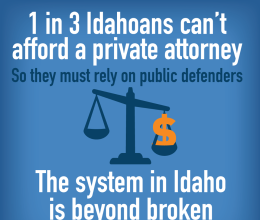Accelerated timeline denies stakeholders opportunity for meaningful input
BOISE, Idaho — Wednesday afternoon, Governor Brad Little signed into law House Bill 658, a law that prohibits the disclosure of entities or persons supplying, manufacturing, dispensing, or prescribing chemicals or substances used in state executions. The law effectively makes it impossible for the public or the courts to know whether executions will be carried out humanely and in compliance with state and federal laws, and the U.S. Constitution.
“It’s a disappointing outcome for anyone who values governmental transparency and accountability,” said Lauren Bramwell, policy strategist with the ACLU of Idaho. “The people of Idaho are tired of government officials supporting cruel legislation that raises constitutional concerns at every turn. Idahoans deserve transparency, especially when the State is exercising one of its greatest powers—the power to end someone’s life. Prisoners should be able to access critical information about their execution so that they can raise legitimate challenges to execution methods that may subject them to horrific pain.”
The bill was delivered to the Governor on Wednesday morning and signed into law that same afternoon. “We tried to coordinate a meeting with the governor’s office and Idaho’s Federal Defender Services but we were ultimately unsuccessful,” said Bramwell. “It’s a shame that the governor’s office chose an accelerated timeline over the opportunity to meet with critical stakeholders on a bill that raises such significant constitutional concerns.”
“We are disappointed that Governor Little went forward in signing HB 658, a bill that has numerous constitutional flaws”, said Deborah Czuba, Supervising Attorney with the Federal Defender Services of Idaho. “The bill, which was pushed through by the Idaho Attorney General and the Idaho Department of Corrections, shields critical information from the public and the courts. It was a bill that deserved careful study and consideration of both its ethical and legal ramifications. There is no question that it will be the subject of future legal challenges.
Currently, 23 states and the District of Columbia have abolished the death penalty. Three states, including California, Oregon, and Pennsylvania have issued a gubernatorial moratorium on the death penalty.
Read more about House Bill 658
Read more about the ACLU’s opposition to the death penalty
The American Civil Liberties Union (ACLU) of Idaho is a non-partisan, non-profit organization dedicated to the preservation and enhancement of civil liberties and civil rights. The ACLU of Idaho strives to advance civil liberties and civil rights through activities that include litigation, education and lobbying. Learn more at acluidaho.org.
Federal Defenders Services of Idaho was established in 1994 and is dedicated to the defense of indigent clients charged with federal offenses. The caseload ranges from petty offenses, to multi-defendant drug conspiracies, sophisticated white-collar fraud offenses, computer crimes, and serious crimes that may occur in the Indian Country and on military installations. Federal Defender Services of Idaho is a non-profit corporation managed by a Board of Directors and funded by a yearly grant from the Congress of the United States administered by the Administrative Office of the United States courts in Washington, D.C. As a Community Defender program it is mandated by the Sixth Amendment of the United States Constitution. Learn more at id.fd.org.


